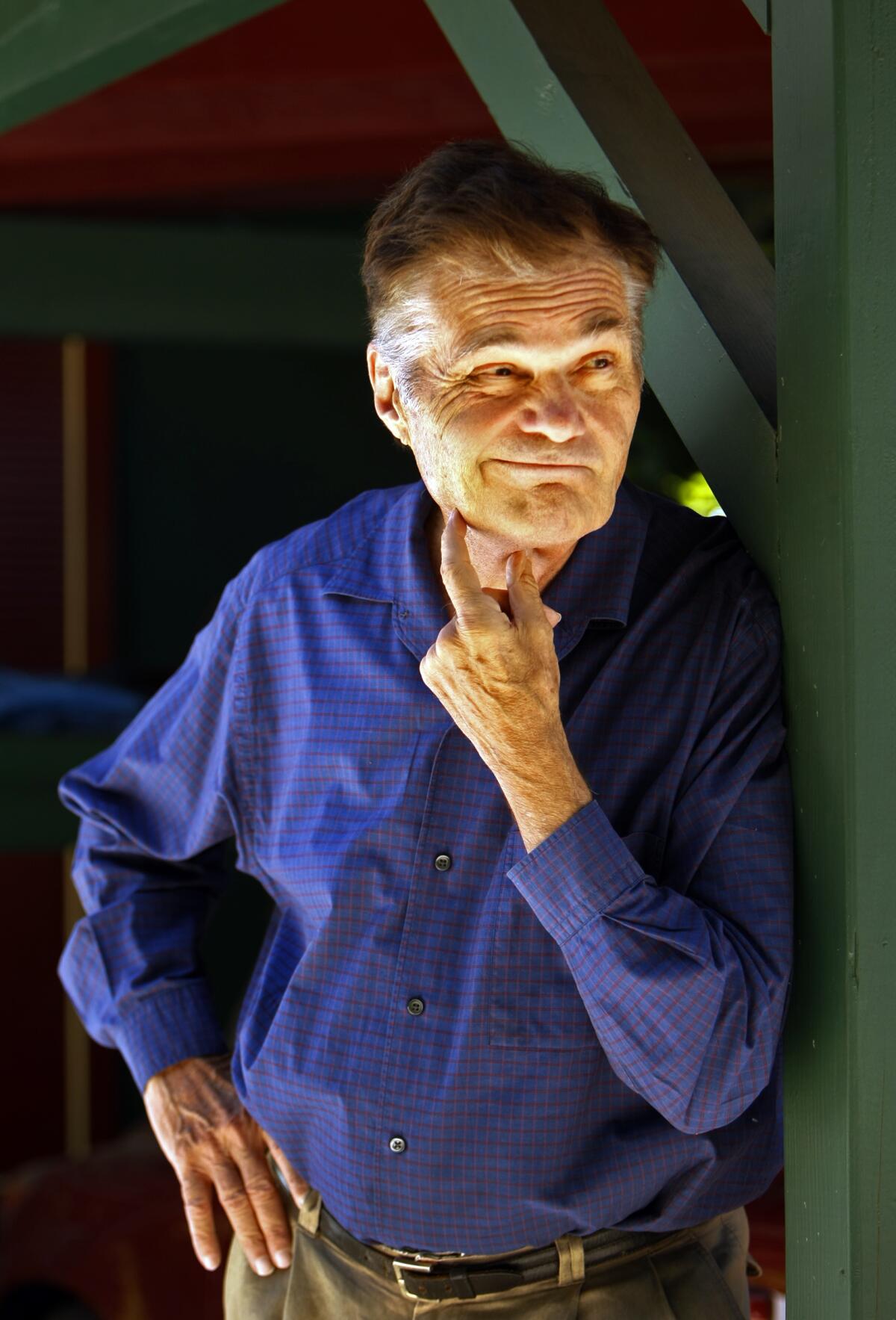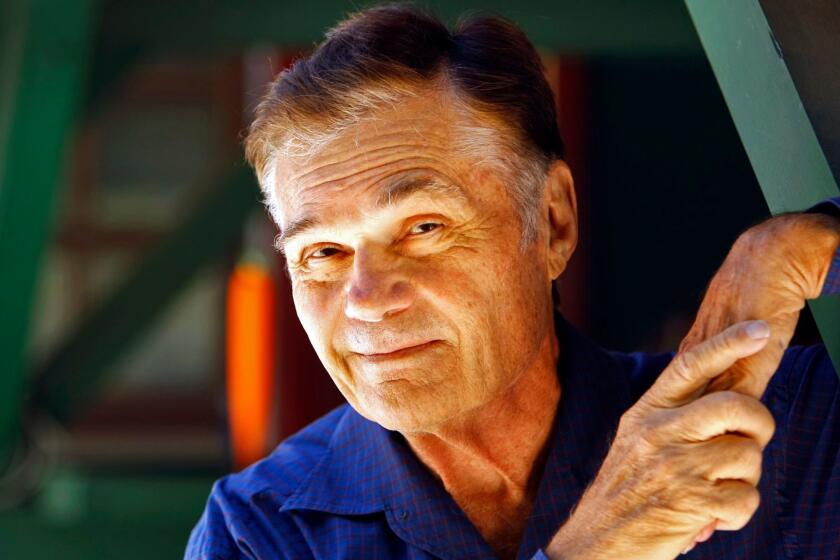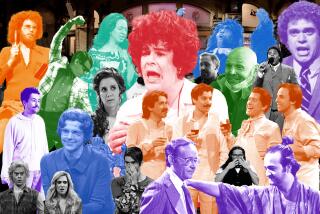Appreciation: Fred Willard, beloved American weirdo, was the special sauce in satire comedy

Fred Willard, beloved American weirdo, colossus of eccentric normality, is gone. For an actor rarely cast in a lead role â he is probably best known for the improvisational ensemble films of Christopher Guest, including âBest in Showâ and âA Mighty Windâ â the huge sense of cultural loss occasioned by his death Friday is remarkable. Not a character actor so much as a character who acted, he was always in some essential way himself. If you wanted a Fred Willard type you were going to have to get Fred Willard in: He was a secret ingredient, a special sauce, useful in all sorts of occasions and never out of demand. And weâll never have that recipe again.
That isnât to say that he didnât have range, only that the variations in his performances were always on a theme of Fred Willard. You got two for the price of one: the actor and the role, the person and the personality, superimposed, inextricable. Encountering him onscreen was always a bit of a thrill, as if one had run into him on the street. (âItâs Fred Willard!â) Watching him, you perceived the practiced professional, but also a person who might have strayed onto a set, been handed a script â or not â and told, âAction.â Indeed, itâs evident just how useful and adaptable his talents were both from the quantity of his credits and their range, which ran from mainstream to fringe, comforting to transgressive, âEverybody Loves Raymondâ to âTim and Eric Awesome Show, Great Job!â
Willard was already over 40 when the mostly faux talk show âFernwood 2 Night,â on which he played announcer-sidekick Jerry Hubbard to Martin Mullâs host Barth Gimble, made him (sort of) famous in the mid-1970s. Not that you could tell to look at him: Square-jawed, broad-shouldered, with good hair, a wide smile and bright eyes, he was boyish even as a senior citizen. (He could be coy about his age, interviews reveal; I canât be the only person amazed to learn he was 86 when he passed.) Jerry Hubbard set a pattern for Willard characters to come â self-assured, well-fed, oblivious to criticism, dim. (âDid you ever wonder where weight goes when you lose it? Probably thereâs a huge mountain of yellow fat theyâre going to discover someplace, out where the elephants die or something,â Jerry asks a guest diet guru.) Willard and Mull would reteam several times over the years, including Mullâs âThe History of White People in America,â as romantic partners on âRoseanneâ and as robots in an episode of âDexterâs Laboratory.â
Before âFernwood,â there was a decade and a half of steady work, including the Greenwich Village comedy scene, a stint in Chicagoâs Second City and the improvisational comedy group the Ace Trucking Company, which appeared often on variety and talk shows in the late 1960s and early 1970s. There were guest shots on âThe Bob Newhart Show,â âLaverne & Shirley,â âThe Love Boatâ and âLove American Style.â
Afterward came âSpinal Tapâ and the Guest films â a travel agent and community theater star in âWaiting for Guffman,â a clueless commentator in âBest in Show,â a sitcom actor turned folk group manager in âA Mighty Windâ and more â as well as roles in Steve Martinâs âRoxanne,â âAustin Powers: The Spy Who Shagged Me,â âHarold & Kumar Go to White Castle,â the âAnchormanâ movies, and âWALL-E.â Television appearances included âLois & Clark: the New Adventures of Superman,â âKing of the Hillâ and Scott Aukermanâs âComedy Bang! Bang!,â which owed more than a little to âFernwood.â He hosted the reality series âReal Peopleâ and Sid and Marty Krofftâs political puppet show âD.C. Follies.âA seven-episode stint on âThe Bold and the Beautifulâ earned him a Daytime Emmy in 2015. That is just the tip of a very large iceberg. The quality of projects varied over the years, but not the quality of the work.
Fred Willard, an improv comedy master known for playing a goofball so straight it wasnât always clear he was in on the joke, has died, his agent said.
Lately, and into this year there was a recurring role on âModern Family,â as Frank Dunphy, father to Ty Burrellâs Phil, and regular appearances on âJimmy Kimmel Live!â playing a variety of characters in topical skits (much as he had earlier done for Jay Lenoâs âTonight Showâ). If Willard finally seemed a little age-worn, his Fred Willardness remained intact: He was upright, beaming, playful, odd, with a voice capable of reaching the last row in the theater: âHave you ever pulled a body out of the ocean, Jimmy?â he asked, as the captain of a cruise ship. âSometimes they donât have eyes.â Later this month, heâll be seen in Greg Danielsâ Netflix satire âSpace Force,â as the father of star Steve Carrell, casting so apt one wishes it had been thought of years ago.
Willard looked the part of a responsible adult â it is somehow not surprising to discover that he graduated from two separate military schools â but inside he was an amusement park, and not just the roller coaster and carousel but the haunted house and the hall of mirrors. The straighter the role, the more ironic Willardâs mere presence could seem; and yet he could be subtle and touching too. During his final appearance on âModern Family,â in January, while skirting the deep end of a discussion that will be their last, he reaches out and reassuringly touches his sonâs arm, a casual gesture and a beautiful moment.
There is an innocence about his characters, including the version of himself he brought to talk show appearances, talking a blue streak, making good but very often bad jokes, showing up on âLate Night With David Letterman,â where he was a frequent guest, with a knife sticking out of his chest. Even when theyâre dodgy, Willardâs people are hard to dislike; the least of them are so comfortable in their skin, so excited by their inspirations, so confident in their philosophies that they somehow become more reassuring than worrying. (âHe would say anything he was thinking,â Willard said of Jerry Hubbard. âIf he got mad and pouted it would just be for a few seconds and heâd open up again.â) They leave you with the impression that somehow everything is fine, even as itâs going off the rails, which makes this a particularly bad time to lose the man that gave them life.
Last year, in a memorable appearance on the Netflix sketch show âI Think You Should Leave with Tim Robinson,â Willard, in an impertinent handlebar mustache, played a substitute organist at a funeral. His instrument was better fit for a circus and his performance included honking horns and breaking plates, as if it were the most appropriate thing in the world. He is all smiles.
âKeep going?â he asks. Yes, one would still like to answer.
More to Read
The biggest entertainment stories
Get our big stories about Hollywood, film, television, music, arts, culture and more right in your inbox as soon as they publish.
You may occasionally receive promotional content from the Los Angeles Times.












